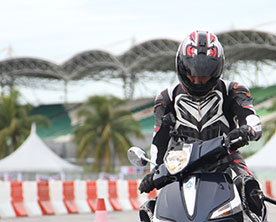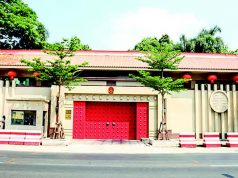Each year there are approximately 63,000 reported road traffic deaths among the ASEAN member countries, although the World Health Organization believes that the actual number lies at around 117,000 per year due either to inaccurate data or undocumented accidents. Within the region, there is considerable variation in fatality rates between individual countries. The Bosch electronics and engineering company has announced their own campaign to lower the number of road deaths by promoting their anti-wheel locking break technology.
“We need to find sustainable solutions for a problem that is the leading death cause among young people in the region, taking the lives of thousands of citizens, and costing the governments a tremendous amount of money, every year,” said Martin Hayes, president of Bosch in Southeast Asia in a keynote address at the EU-ASEAN Business Summit in Manila, the Philippines. “The loss of lives, and cost of damage to property and safety reputation pose an extensive threat to the social and economic progress of the ASEAN member countries.”
For decades now, Bosch has been working on technological advancements with the vision of accident-free driving. The world’s first antilock braking system (ABS) for passenger cars, the commonplace technology that prevents a car’s wheels from locking up during an emergency braking scenario, dates back to 1978. This innovation allows the driver to maintain steering control and in most situations, shortens the braking distance without skidding. In 1995, Bosch improved the technology by developing the world’s first electronic stability program (also known as ESP or ESC) which is today equipped in 64 per cent of all new cars worldwide. In Europe alone, ESP has saved more than 8,500 lives and prevented more than a quarter of a million traffic accidents to date.
As the third-largest two-wheeler market in the world, riders of a motorcycle constitute more than half of all road traffic fatalities in Southeast Asia. Every year, 21,000 fatal motorcycle accidents occur in Indonesia and Thailand alone. A key technology to enhance motorcycle safety is ABS, which enables hard braking without the wheels locking, so that the vehicle remains stable and the rider stays upright. Introduced in 1995, the motorcycle ABS significantly reduces the risk of falling shortens the stopping distance, and therefore the risk of collision. Bosch research estimates that if every powered two-wheeler was equipped with ABS, around one in four of all motorcycle accidents in the ASEAN countries could be prevented. Worldwide, an increasing number of countries such as the European Union, Japan, Taiwan, and India are mandating motorcycle ABS for new vehicles. “The improvement of road safety is not something that will happen overnight. We understand that it’s a gradual process that needs the involvement of various stakeholders including governments, the scientific community, NGOs, and the industry.” concluded Hayes.










